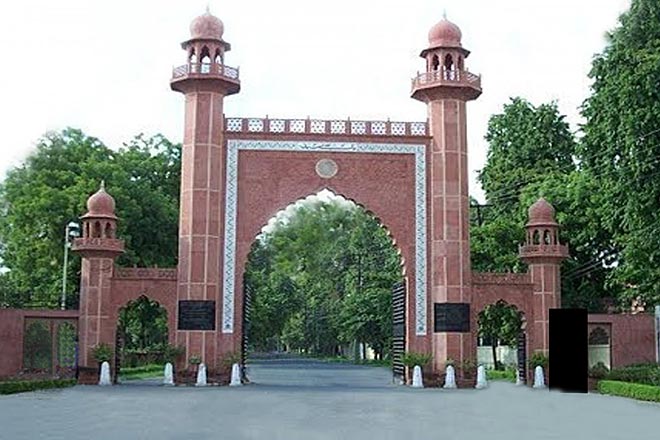The Aligarh Muslim University (AMU) in Uttar Pradesh’s Aligarh has become a Covid-19 hotspot. In the past three weeks, at least 50 current and retired staff of the university are reported to have succumbed to Covid-19, giving rise to a wave of panic and uncertainty on the campus. According to the Hindustan Times, at least 15 serving faculty members, 25 retired teaching faculty, 15 staff members and two schoolteachers from AMU have died in the past three weeks of Covid-19.
The uncontrollable outbreak on the AMU campus has led to vice chancellor Tariq Mansoor writing to the ICMR – requesting the apex medical body to find out if a particular virus variant is wreaking havoc in and around AMU. However, the Aligarh Muslim University outbreak seems to have much less to do with a new virulent strain than it has with the lax approach of not just campus authorities, but also faculty members when it comes to Covid-appropriate behaviour and getting timely vaccinated against the virus.
According to campus sources quoted by ThePrint, AMU professors are not the only ones affected. Last week, the burial site inside the AMU campus saw 29 funerals in a day. It has been seeing 7-8 burials almost everyday, most of which involve Covid deaths, the sources add. Former AMU student union president Mazin meanwhile remarked, “I myself have attended 70 funerals in the last 10 days or so and there must be so many others like me who are attending multiple funerals. The burial ground on AMU campus is almost full.”
Among the Muslim community, for the past one year, there has been a marked sense of hesitance towards hand sanitisers, and more recently, towards Covid-19 vaccines. According to a report by Jagran, the same hesitance has been plaguing AMU – which is why the unfortunate demise of close to 50 staff members (both present and retired) has been reported from the cluster. The vaccination drive has reportedly been very slow paced at AMU, which is why the second wave of the disease in India seems to be taking an unprecedented toll with the Muslim University’s campus.
The psychological impediment among AMU faculty and staff to get inoculated against the novel Coronavirus seems to be stemming from the belief that vaccines are ‘haram’ as per Islamic law. Of course, this is conjecture on our part – but had the university done its part to ensure vaccination of all faculty and staff members, many would have definitely been able to recover from the infection. In December last year, TFI reported how in Indonesia – the most populous Muslim country in the world, Halal certification for any COVID -19 vaccine had become equally, if not more important than the phase III human trials of the vaccines themselves.
The desperation among the Muslim community to get vaccinated with only Halal-certified jabs seems to be playing a big role in many from the community unfortunately being unable to fight against the infection. Had AMU done its part to spread vaccine awareness and ensure that its faculty get inoculated – the perpetual state of misery on their campus could have been averted.
We cannot dispute the fact that apart from the vaccination drive in India being attributed to the scientific community of the country and vaccine manufacturers, it is also being seen as a flagship initiative of the Modi government. Traditionally, the Muslim community has remained apprehensive of the Centre for as long as Narendra Modi has been Prime Minister. Add to that the inherent fear of vaccines – the community seems to be playing a big price for its apprehension, which by the way, are unfounded in nature. Already, Samajwadi Party chief Akhilesh Yadav had proclaimed earlier that he would not take the Covid-19 vaccine, since it was a “vaccine from the BJP”. Another SP leader, meanwhile, had claimed that vaccines made people impotent – and that is a chance many among the minority community are not willing to take
Interestingly, the spate of deaths in AMU had begun close to a week after Ramzan started. It is no secret that the Muslim community attaches great importance to the month of Ramzan. It is therefore not entirely impossible that many from AMU flocked to the markets and crowded venues to prepare for Ramzan. Already, a glimpse of the excitement pervading the community was seen recently when Hyderabad’s markets were filled of Muslims shopping for the month-long fasts while flagrantly disobeying all Covid-appropriate behaviour and roaming around without masks.
As for hand sanitisers, many in the Muslim community feel that since they contain alcohol, they are haram according to Islamic law. Halal is the Arabic word for permissible. Halal food or products, and in this case, vaccines are those which adhere to Islamic law. Non-halal products, referred to as ‘haram’ are generally viewed as a taboo among Muslims.
A toxic cocktail of all such factors seems to be contributing towards the rather uncontrollable Covid-19 outbreak within the Aligarh Muslim University campus. The deaths of over 50 AMU staff members proves that vaccination is the only way out of this pandemic, and that we must embrace vaccines against Coronavirus immediately. Theological rigidity will only end up claiming more and more lives.
